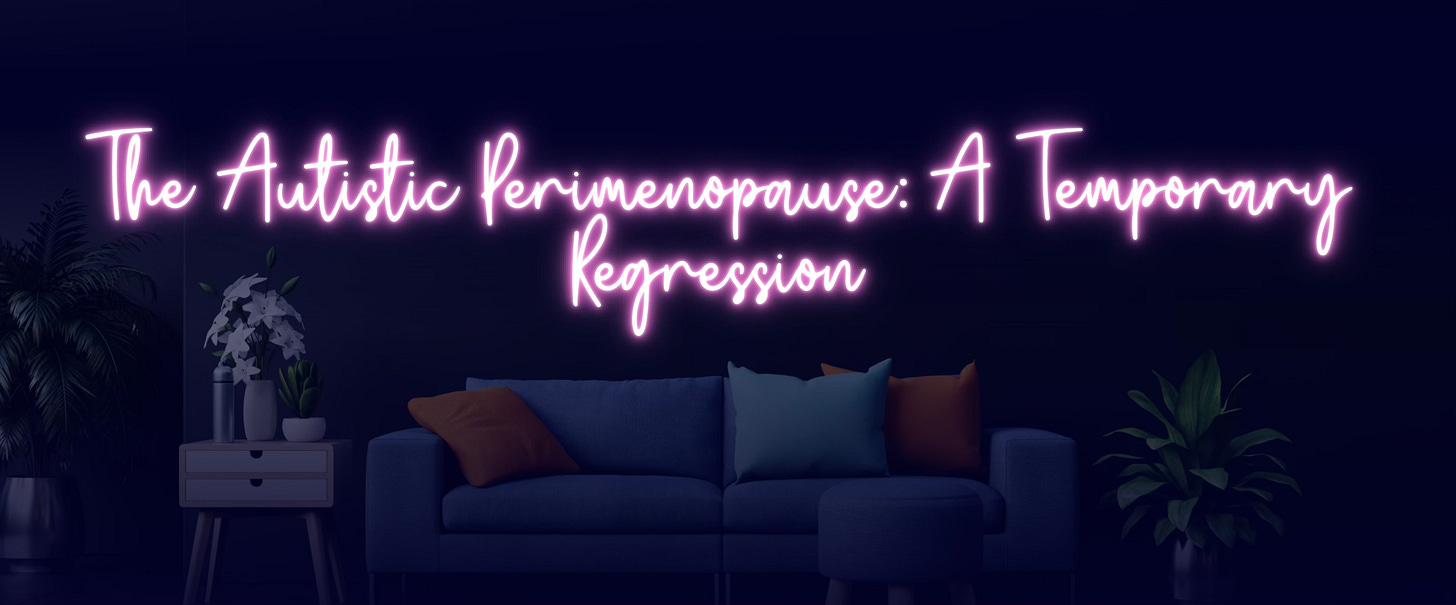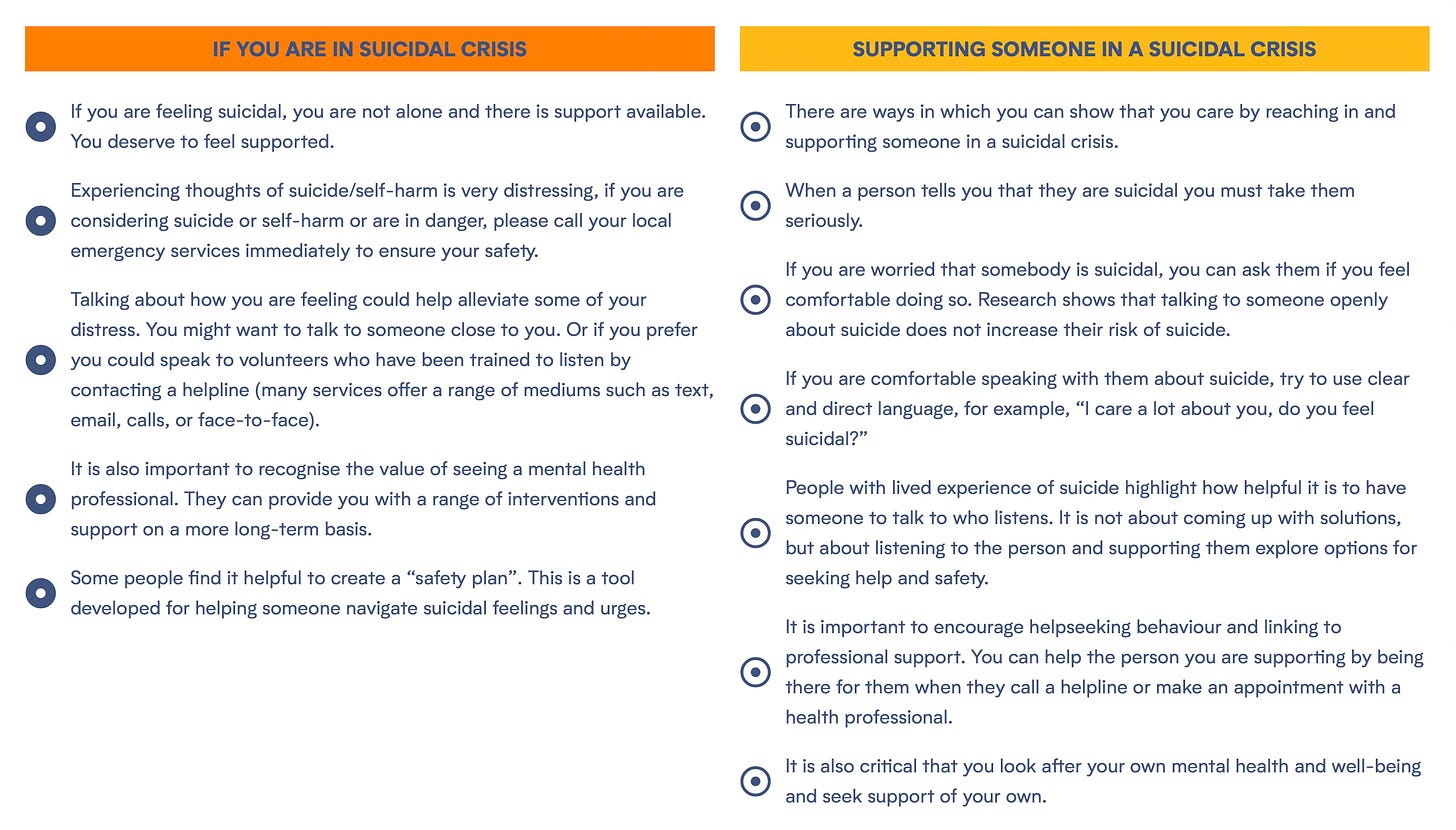Mental Health is for Neurotypicals
Mainstream services intergenerationally fail autistic families
Sorry this is a bleak one! Save it for another day to come back to if today you are feeling especially vulnerable. Please reach out here for local helplines in your area if you are considering suicide, self-harm or are in danger. Please take care of yourself and talk about how you are feeling. You are important to me and this community.
While the world collapses and burns around us, some of us are wired to be taken down by it all more than others. Unbelievably to me, there are people out there who can switch off the news, end a conversation, or resolve a dispute without ruminating on it for days, weeks or months to come.
At 38 or so, I was late diagnosed autistic and chronically anxious. Much of my childhood was spent playing happily alone in my room with my dolls, or doubled over in pain with worry.
I worried about everything.
I worried about everyone.
I worried nonstop.
I recall aged around 9 my family doctor examined and questioned me about my abdominal pain. It was unremarkable and unproductive. There was no diagnosis nor follow up.
I was dismissed, a young starter of the “worried well” world. Or perhaps you could say I was medically gaslit at an early age.

It never fails to astonish me how my autism, ADHD (diagnosed aged 39 - I thought I would be fixed by 40, ha ha!) and anxiety was repeatedly missed through years and years of school refusal and situational mutism. The systemic failing at the time was that girls were not thought to be autistic nor ADHD; there was no assessment path for me. I am not alone in this.
So many of us are the lost generation of autistics and neurodivergents, left floundering in this world that is neither built for us nor kind to us.
Countless people are misdiagnosed with the wrong psychiatric conditions, or left undiagnosed altogether. In my case, until my mid thirties, I had the ADHD-fuelled energy to invest in extreme social camouflaging and masking, with the intellect required to study and imitate neurotypicals, until my autistic perimenopausal onset left me utterly bereft of my former self, my functioning capacity, and my will to live.
Now aged 43 - and a long way into autistic perimenopause - my neurodivergent kids and I have been triaged and rejected by mental health services many times over. One of my friends was recently feeling suicidal and received a phone call from adult mental health services here in Aotearoa NZ. As part of the medical triage, she was asked why she should be given priority over anyone else needing mental health services when there are so many other people also in need? In her extremely vulnerable state, she told them that she didn’t, and that they should give her place on the waiting list to someone else.
I am glad to say she is okay, in the way that many of us who are suffering daily are “okay” - hanging in there. Trying to hold on for the sake of our families, but at the mercy of our midlife hormonal rollercoaster…
Mental health services are ill equipped to deal with neurodivergent people. As many autistic parents of autistic children already know, it is not unusual to reach out to child and adolescent mental health services (CAMHS) in desperation only to be told that your neurodivergent child can’t go on the CAMHS caseload since their “issues” are due to autism, not mental health. Even when those issues are suicidal ideation, death threats, self-harm, suicide attempts and so on. To anyone outside of the mental health services, these are all obviously mental health distress signals. They are not simply an expected part of the autistic presentation.
Upon speaking to the paediatric teams at mainstream Child Development Services (who often wouldn’t be able to correctly diagnosis autism if it kicked them in the face), they will refuse to see an autistic child who presents with the symptoms above because it’s a matter for mental health services.
Do you know how many families are endlessly ricocheting between all of these services, whilst spiralling into levels of acute danger?
The most vulnerable families - the families with the greatest need - get pushed away simply because they are not neurotypical. Because they don’t conform to the illusion of what mental distress should look like.
Meltdowns and internalised aggressions aren’t addressed as the cries for help that they really are.
Parents of autistic children are offered places on mainstream parenting courses, which are invariably run by neurotypicals and for neurotypicals. Told that we aren’t parenting properly. Told that we are creating these problems for ourselves. Told that they can’t really help with the severity of issues we face in our homes, but that CAMHS will give us the help we need…
Where is the appropriate mental health provision for autistic and neurodivergent people?
Our mental health issues co-occur alongside our neurodivergence, and are as important as each other.
Will the crumbling mental health services ever catch up with meeting the needs of neurodivergent people? Or are we all going to have to just pull ourselves together, or face being left to collapse and burn?
What have your experiences of mental health services been? Did they diagnose or miss neurodivergence in you and yours?
Sorry this was a bleak one! Please reach out here for local helplines in your area if you are considering suicide, self-harm or are in danger.







You summed up my Canadian experiences perfectly. The psychiatrist that we saw for my daughter wouldn’t continue meeting with us after she was diagnosed autistic. Even though…she’d been autistic before the diagnosis! The child and mental health team did neurotypical counselling, and sent me to a parent course for child anxiety. When I called once for emergency help during a meltdown, the dispatcher convinced me that I didn’t really need police or ambulance because “it’s not that bad, right? She doesn’t have a weapon? Do you really need someone?”
The things that have helped are appropriate medication, leaving traditional school, and ND-affirmative counselling and parent consultant. I have a dream that I can eventually be one of those ND-affirmative “helpers”!
I have seen the incredibly frustrating not-my-department runaround so many times. It's heartbreaking (and incredibly wasteful and inefficient). And when I did manage to access intensive mental health treatment, the programs themselves were in such overstimulating environments that while I did get some benefit, I was also having meltdowns on the daily.
On a more positive side, learning about some of the missing/missed pieces in my neuromix has given me more compassion and understanding for my lack of tolerance to certain things. And combined with COVID accelerating access to telehealth, getting outpatient mental health treatment with ND-affirming providers while in a physically tolerable environment has increased, for which I am grateful. (I've made more progress able to stim and rock at home during sessions.)